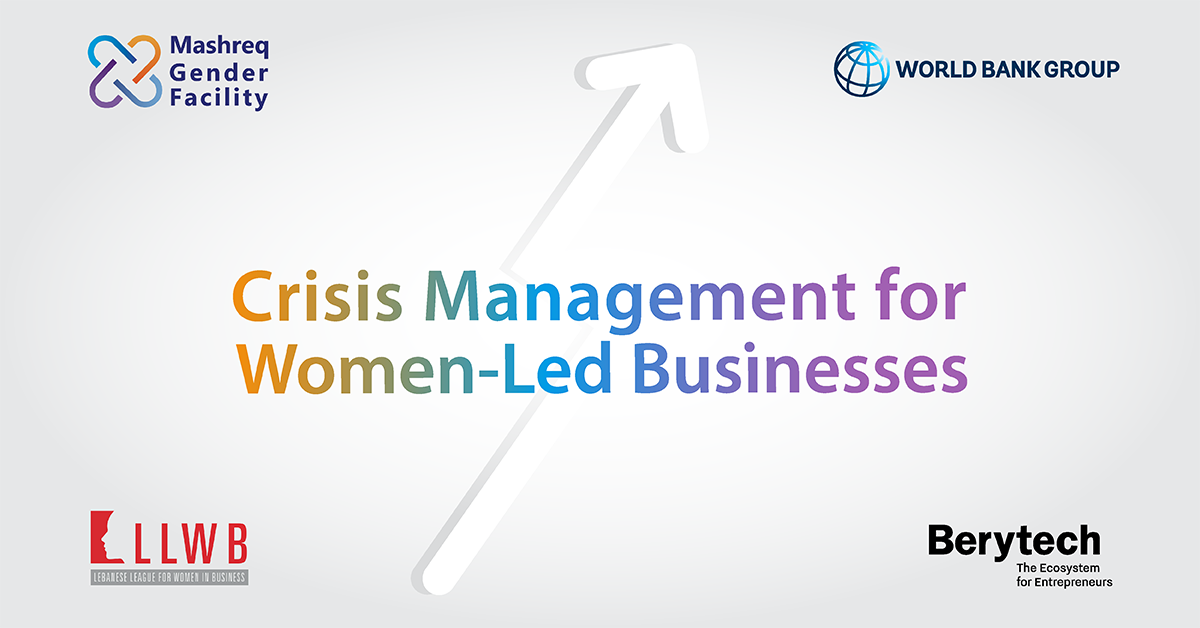
The Crisis Management for Women-Led Businesses program provided support to 160 women entrepreneurs in Lebanon, helping them to grow sustainable businesses that are market-oriented, profitable, scalable while facilitating job creation or maintaining existing jobs.
This program is produced as part of the Mashreq Gender Facility (MGF) where the World Bank Group has partnered with Berytech and the Lebanese League for Women in Business (LLWB) to provide capacity building in times of crisis for women who want to grow their businesses and enhance their business model, marketing, financing, and networking opportunities, as well as learn how to be resilient in the face of crisis.
Support, mentorship and training
The objective of the program is to provide women business owners with the needed understanding of the crisis mechanism and the required tools and frameworks to understand the crisis impact on their business and to help them develop adequate mitigation plans to navigate the repercussions of the current crises and ensure sustained operations.
For that, 80 business advisors were selected and trained on crisis management so that they can support the women-led businesses admitted to the program. They provided support to 160 women-led businesses, based in Beirut, Beqaa, North Lebanon, South, and Chouf.
After an intensive 2-day crisis management training, each businesswoman was matched with advisors based on their needs who continued to give them support throughout the program and develop individual action plans to them on how to improve their business resilience, performance and growth.
Challenges faced by trainers
The economic situation and the COVID 19 crisis have had a huge impact on the way business is done, forcing change and creating new opportunities for market disruption. Trainers in the program worked to help women business owners to innovate and be agile in re-orienting their business and capitalizing on these opportunities, maintaining their chance to survive and grow.
Patricia Kebbe, a trainer in the program, highlighted a common challenge she worked on with the women she coached, beyond fixing the physical and emotional damage caused by the Beirut blast, saying that, “both women I worked with believed in finding brighter opportunities for export to absorb the financial impact of the crisis. For that, the importance of revamping or building their e-commerce strategies will be critical for their future success. E-commerce will remain a key growth opportunity for them, underscoring the need to revisit or develop e-commerce strategies moving forward.”
Another trainer, Dima Bou Moussa, pointed out the importance of providing networking and connections in helping the women she worked with reach their objectives. “One company was a successful catering company operating in Lebanon and I helped them identify a possible export activity while capitalizing on existing infrastructure, human resources, and recipes. For the project to be successful, the organization would need experts who can assist with identifying – and probably extending – product shelf-life, assist in preparing labels that conform to the requirements in destination countries, and provide contacts of distributors or retailers in selected markets. My work revolved around creating the connections the company needed to grow, attract funds, and access needed services,” explains Dima.
One particular woman required her assistance for facing uncertainty regarding the orientation she should take with two businesses she was handling and the area she should focus on. “To overcome the dilemma, we conducted an objective 360-degree assessment of both businesses thus identifying their critical success factors which allowed her to select a priority activity that presented more readiness to scale and to export and that required less investment.”
Women in the Program
Many of the women-led businesses in the program did not have the resources and skills to rebound and seize opportunities arising from change. The support they received from the program pushed them to adapt and strengthen their business models to sustain their businesses, providing them with the skills and know-how they need to manage their businesses during these crises while disrupting old business models, identifying new opportunities, and finding new revenue streams.
One common piece of advice that these women entrepreneurs give based on their experience is to think out of the box, especially when it comes to contingency planning, as they have learned it the hard way. “This is the right time to be aggressive in your strategy,” points out Roula Haidar, currently heading L’artisan Du Liban, a non-profit working since 1979, to support local artisans and promote local crafts. In times of crisis, her best advice to any business owner would be to “surround yourself with loyal and trusted people and reach out for your network of friends, partners, and stakeholders. Don’t be shy to ask for help! Find a way to sharpen your sword and recharge your energy for your sanity and the ones around you.”
Najwa Grace Ibrahim, Co-founder & CEO of Trusted Ability, a company that provides hourly caregiving services in and out of homes for individuals with physical, developmental, psychological, and mental special needs, advises fellow business owners to “understand the critical points of their operation by mapping each function and identifying the risk areas within this function and then consider each risk area separately and identify the likelihood versus the impact of each risk to determine the severity of the risks.”
Read more on how women business owners are surviving the crises.









